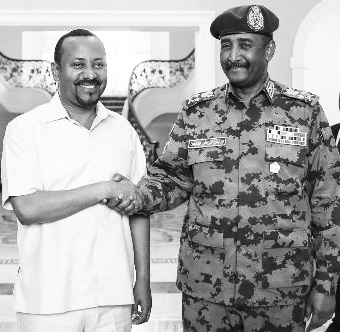
Will Ethiopian Mediation Stop a Bloody Finale?
For those of us who closely follow the current Sudanese political crisis, it is quite evident that the situation has become increasingly intractable for the following reasons.
First of all, the military council that has replaced Al Bashir’s 30 year rule is clearly wavering between taking one of the two alternative courses of action. On the one hand, it is trying to negotiate with the opposition and work for a peaceful transition to democratic rule. On the other hand, its hands are itching to use force to suppress the popular revolt and return the country to the dreaded military dictatorship.
Judging from the nature of the regime or the military faction in power, the second option seems more attractive to it. Why? Because as one theory has it, among the officers in power in Khartoum, there might be some who took part in gross human rights violations under Al Beshir and who do not want to be accountable for them or join him in prison. So, they seem to be choosing to cling power come what may or if possible, negotiate their safe exit.
The second option would be unnatural for the military council to follow because it has already betrayed the pledge it made to the people to hand over power orderly within a certain period of transition time. This is unusual for the military in Africa that, more often than not, came to power through hard or soft coup.
No military group, council or committee would tolerate a popular revolution that is threatening its supremacy. In the first phase of the revolt, a faction of the military emerges supporting the popular demands as was the case in Khartoum very recently.
In the second phase, as it is the case now, the military tend to betray its first choice and highjack or suppress the revolution. The classic example could be Ethiopia after the February 1974 Revolution.
In case the military decides to lead the revolution, the regime is often ousted through a counter coup. Thomas Sankara in the former Upper Volta, now Burkina Faso, is the best example. When the current military strongman in Khartoum visited a number of countries in the region before the current crisis, he was apparently seeking advice from governments in the region.
The Sudanese popular masses are angry principally at this betrayal of faith by the regime in power. At least they expected the transition period to be managed by a joint military-civilian administration until elections would be held.
This was also what the military seemed to agree to and the talks were about the composition of the transitional council until it was suddenly disrupted by the regime’s violent actions and the opposition’s latest strike action in Khartoum. As a result of this, Sudan is caught in a creeping chaos and the military has its hands dipped in the blood of innocent civilian protestors and more violence and chaos are expected until the political impasse is resolved peacefully, if at all.
External players in the Sudanese crisis have a lot of leverages to turn the situation in their favor or advise the head of the military council to take tougher action against the popular protestors because they may be scared by the prospect of the Sudanese revolution spreading to their countries.
Nothing is known about the outcome of Burhan’s visit to Egypt and his talks with Al Sisi. Many analysts tend to believe or guess that Al Sisi would not advise General Burhan to hand over power to the civilian opposition and return to the barracks.
Saudi Arabia is said to have paid 14 billion dollars to the military after it suppressed the Muslim Brotherhood party in Egypt in a bloody coup. It has also reportedly pledged 5 billion dollars to the present military council in Khartoum by way of assistance.
America under Barak Obama did not left a finger to denounce what happened there because it chose Al Sisi over Mohamed Mursi when it comes to its national interests in the region. The same happened when Libya was forced to slip into anarchy as a result of US and NATO operations to oust then Libyan strongman Muamar Ghadaffi and pushed the country into chaos and anarchy that has not abetted until now.
No doubt that Ethiopia is a regional player in the Sudanese political crisis. The reformist regime of Abiy Ahmed has recently scored a series of diplomatic successes in the region, such as the unraveling of the Ethio-Eritrean politico-military Gordian knot, the rapprochement he engineered between Eritrea, Somalia, Kenya and the peace initiative in South Sudan.
Meanwhile he has emerged as an effective peacemaker in the region. No doubt that Abiy is involved in the Khartoum crisis not only to bring his new diplomacy into action to prevent the situation from deteriorating further that can possibly plunge the country into civil war as many fear. He has also Ethiopia’s national interest in mind. Without going into the details, it is quite obvious that Addis Ababa will benefit enormously from a peaceful Sudan.
Ethiopia’s new diplomacy towards the new regime in Khartoum seems to be focus on creating a kind of entente cordial between regime and opposition. In the last few days, Ethiopian diplomacy in Khartoum has produced hope that had quickly been dashed by the mass strike action and then revived to create a new hope.
The release of key Sudanese opposition political figures from prison is considered as one of the major hits of the new diplomacy. According to ambassador Mohamed Drir, Ethiopian diplomatic envoy in Khartoum who recently spoke to the German Deutchvelle radio Amharic program, both regime and opposition are seriously considering Dr. Abiy’s diplomatic initiatives and that all efforts are being made to unravel the situation.
Many businesses and public institutions that had been closed down following the strike actions in Khartoum over the last few days are said to be opened and that life is slowly returning to normal.
The situation in Sudan is not only complicated as any transition from dictatorship to democracy is. It is also very fluid and dangerously unpredictable. Events are changing quickly as external players are coming into the fray one after the other. The US has sent its most experienced diplomat in the region.
Former ambassador to Ethiopia Mr. Imre Najy is a very experienced politician who knows well the Horn of Africa and its challenges. His advice to the military may be something like this: stop killing protestors, share or hand over power to the military or face crippling sanctions. Donald Booth has joined him lately to add force to American pressure.
The Russians and some Arab countries are also taking stands on the crisis in Sudan. Jihadists too may be toying with the idea of going into Sudan to create further chaos and exploit the situation to advance their agendas. The AU had been aloof during the Libyan crisis eight years ago.
It has now come up with a clear and unambiguous position asking the military to hand over power to a civilian government. It has temporarily barred Sudanese diplomats from taking part in the affairs of the organization until its resolution is respected by the military in power.
Dr. Abiy’s diplomatic advantage may be the experience he gained in the course of dealing with the problems of the transition in Ethiopia that is more complex than the Sudanese imbroglio. What makes the Ethiopian transition more difficult is its ethnic dimension and the contradictions between various ethnic groups vying for resources and power. Sudan is luckier in this regard. The political lines are more clearly drawn and the stakes are clearer although Khartoum too has its Darfur and Abiye region to deal with.
Ethiopia’s confidence in dealing with its own problems of transition can be an asset for Sudan and this is apparently what we are witnessing now. Ethiopia’s self-confidence and impartiality are also additional assets. Ethiopia has no vested interests or alliances to protect or defend in Sudan.
It rather has a proud record of peacekeeping in Darfur and elsewhere. However, total breakdown in Sudan would be a catastrophe not only for Ethiopia but also for the region as a whole.
Ethiopia’s new diplomacy as it is manifested in the case of managing political transition peacefully has also earned respect across Africa and around the world. All these factors combine to create a more optimistic prospects for Sudan because failure to deal with the ongoing crisis might have cataclysmic implications to the Horn region as a whole.
For now, Sudan has to face the impossible choice between the devil and the deep sea as it is caught between the hammer of a popular revolution and the anvil of a dangerously wavering military. Its choice will matter not only for the Sudanese people but also for the entire people of the Horn and Africa.
If Ethiopia succeeds in playing the role of impartial mediator and stop a final showdown between regime and opposition that would represent an enormous boost to its diplomatic profile in the region. No wonder that world is trembling and watching the outcome with deep concern and hope.
The Ethiopian Herald June 16/2019
BY MULUGETA GUDETA




